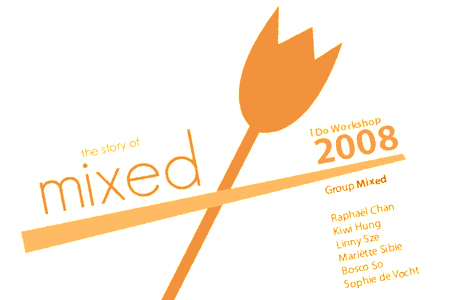
By Philine Bracht
How would you like the surprise when you realize your cozy hotel suite is made of paper? And what do you say when your Hong Kong host aunty Lucy writes to invite you back to visit the tree you planted years ago and eat its fruits? And on your next visit to Amsterdam you could make your own Gouda cheese – six months later it would be sent to your home – complete with a memorable label.
These and others are fresh ideas for the hospitality branch students have come up with during an international design workshop this summer. Organized by School of Design, The Hong Kong Polytechnic University, “I.do 2008” took place in Hong Kong, Shenzhen and the Netherlands. “I.do” (the international design opportunity) was created as an innovative design workshop by PolyU Design four years ago. Theme of I.do 2008 was Hospitality and the impacts of changing demographics on designing.
Participants
Apart from PolyU Design and TU Delft’s IO Faculty, the European partner, four other renowned institutions were invited to participate. They are: the School of Hotel and Tourism Management of HK PolyU, Hong Kong Design Institute; from The Netherlands the Design Academy Eindhoven and the Hotel Management School in Maastricht. The six institutions sent four students each and staff to participate.
The international faculty from different design disciplines and from Hotel and Tourism Management work with the multi disciplinary and multi cultural student teams. Renowned experts from hotel management, service design and architecture contributed.
Design process magic
“I.do” is set up with a number of ground rules which have proven to speed up the learning process:
- The membership of the teams has a student from each participating institution and is assigned in the beginning
- An exchange of host and guest roles takes place when the workshop is held in different locations and visits are made
- Each week starts with a review of the past week, a schedule for the week, and ends with a presentation on Fridays. This leads to performance pressure which helps in the exchange and transfer of skills and knowledge
- Scheduled tutorial session with a tutor team that stays the same throughout the six weeks are held every week
- Feedback meetings and discussions are arranged between staff and student team members
- Peer assessment takes place in a round circle session
- Qualitative interviews help to clarify issues and give input
Feedback and comments of the participants
Working with students from other design fields and disciplines opened up ways to learn different methods, understand different standpoints and learn about different processes.
To conduct the workshop in the two countries where the students came from was the best driver for actually gaining in-depth understanding and developing new ways of seeing and communicating. That they had to go to others’ places and cook food together, share skills and knowledge was perceived as invaluable.
“Seeing people do things differently makes you aware and reflect on your own culture.”
“The cultural difference was nearly bigger between different schools programs for a similar field than between Western and Asian students.”
“Free time is very valuable for learning – in Holland we had more free time which was very good for work on project.”
“That we had a presentation every Friday was very good. We HAD to do something.”
“We may be able to use design methods in our field of hotel and tourism management.”
“I.do was very tiring, the program style is like one year of study!”
Here is one teams’ work as an illustration of the “I.do” workshop process:
Team MIXED
This group was conscious about their differences from the beginning and was probably the most outspoken about their internal difficulties during the process. The differences of design disciplines, ways of working, and expectations of outcomes led to many discussions, frustration and to compromises in the end when discussion would not work. This group became a most productive team.
As all groups, “MIXED” had to identify their primary focus question after initial research. Their question was: “How can you, as a host, create less distance between you and your guests?”
The group decided to work towards “Creating a total new hotel experience by stimulating personal interaction”. They said “Keeping in mind that we want to create less distance between the host and the guests, we looked at all the different aspects in hospitality. Because of all these different aspects, we decided that we didn’t want to design one particular product but the whole experience.”
Creativity and concepts:
With “Room Customization” guests can change the room interiors to their own preferences. Decoration materials are found in the corridors and the common room.
At the “Common Room” all guests can gather and spend time. In this common room, there is always somebody to talk to, other guests or staff. Special features like an “Advise Me Map”, diverse workshops to stimulate interaction in a different way, and a dining area with large tables instead of many small ones are in place.
“New Money System” Upon reservation, guest can exchange their skills, services or products for a stay in the hotel. There is no money involved and it’s a win-win situation.
“Growing hotel” is to stimulate guests to come back to the hotel, so every time you come back to the hotel, you will get a bigger and better room but for the same price.
“Leave something behind” was to create loyalty; guests are asked to plant a tree before they leave. This way, they would have something tangible to come back to.




